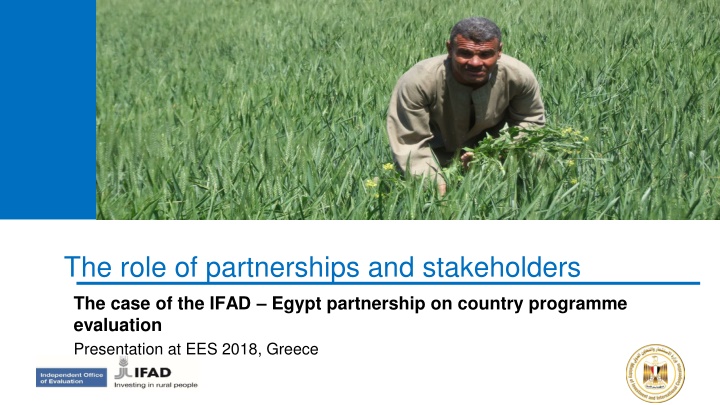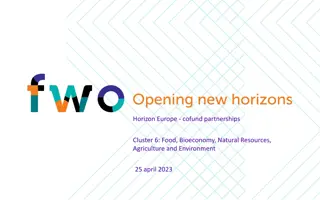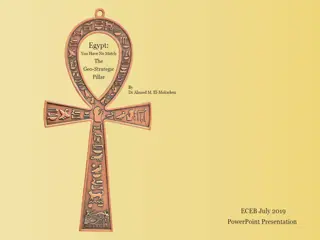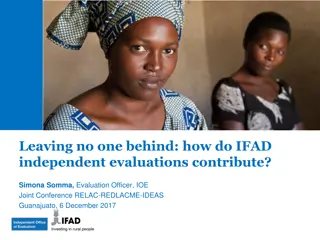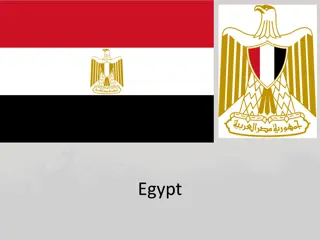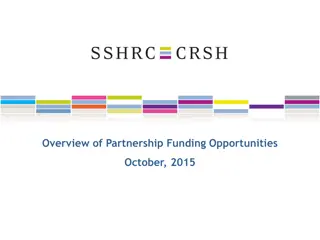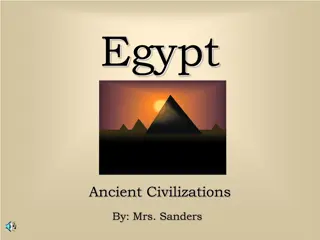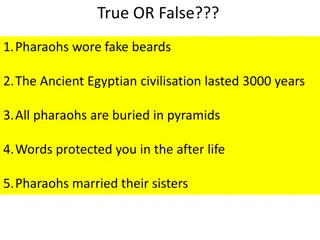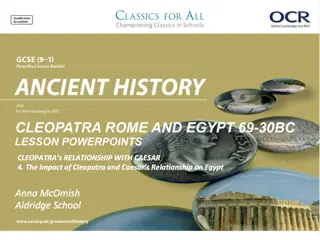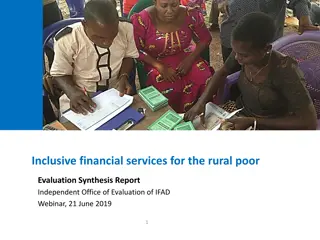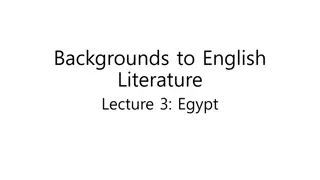Role of Partnerships and Stakeholders: IFAD Egypt Partnership on Evaluation
In the context of evaluation capacity development, this presentation delves into the commitments and mutual accountability of partnerships, focusing on the IFAD Egypt partnership's country program evaluation. It explores the roles of various stakeholders, including the IFAD IOE, the Ministry of Investment and International Cooperation in Egypt, and the parallel evaluations conducted to inform strategic cycles.
Download Presentation

Please find below an Image/Link to download the presentation.
The content on the website is provided AS IS for your information and personal use only. It may not be sold, licensed, or shared on other websites without obtaining consent from the author.If you encounter any issues during the download, it is possible that the publisher has removed the file from their server.
You are allowed to download the files provided on this website for personal or commercial use, subject to the condition that they are used lawfully. All files are the property of their respective owners.
The content on the website is provided AS IS for your information and personal use only. It may not be sold, licensed, or shared on other websites without obtaining consent from the author.
E N D
Presentation Transcript
The role of partnerships and stakeholders The case of the IFAD Egypt partnership on country programme evaluation Presentation at EES 2018, Greece
Context Partnership commitments (Paris, Busan) Mutual accountability as important partnership principle Evaluation capacity development as a commitment of the global evaluation community Conducting (joint) evaluation as practical approach
IFAD IOE Independent Office of Evaluation of IFAD Independent evaluation function Conducting 5 Country Strategy and Programme evaluations every year Committed to evaluation capacity development
Egypt MIIC Ministry of Investment and International Cooperation Charged to develop and implement a government-led M&E system Role in coordinating, monitoring and evaluating the implementation of the Agenda 2030 in particular the roles and contributions of international and national development partners. MIIC M&E Department expanding its role from project evaluation to strategy and thematic evaluation. Funding to the M&E unit to conduct their own - parallel - evaluation of IFAD's CSPE.
Two parallel evaluations Purpose To provide evidence to guide the design of the new COSOP Take stock Document achievement and failures Address challenges Document lessons learned
Two approaches - IOE CSPE to inform new strategic cycle Assessed relevance and effectiveness of IFAD s country strategy Covered non-lending activities (policy engagement, knowledge management, partnerships) Rated standard DAC criteria and IFAD specific criteria Structured report according to evaluation criteria Conducted in-depth evaluation of one project as input into CSPE
Two approaches - MIIC Conceived CSPE as a thematic evaluation Assessed performance according to thematic areas (rural finance, irrigation, rural marketing, research and development and gender) Focused on the economic and social effects of different interventions Rated performance within thematic areas according to DAC evaluation criteria Structured report according to thematic areas Conducted in-depth evaluation of one project as input into CSPE
Process Preparatory meeting (joint) Project evaluations (separate) Field missions (separate) Meeting to share experiences (joint) Commenting on draft report (mutual) Stakeholder workshop to present findings (joint)
CSPE Conclusions- IOE Overall performance moderately satisfactory High degree of continuity and focus in country programme Concentrated and focused approaches effective in addressing poverty issues on a smaller scale. Investment in capacity building insufficient Knowledge and experiences not adequately captured; not used to enable progressive learning. Partnerships were limited and coordination was weak
CSPE Conclusions- MIIC Thematic focus of IFAD s country programme relevant Rural finance recognised as main catalyst for rural development, but did not address actual demand Agricultural research and extension not demand oriented IFAD activities overlooked the different characteristics of the targeted women, especially with regards to education Absence of situation analysis and needs assessment studies compromised the effectiveness of targeting.
Lessons The evaluation has strengthened MIICs role in the coordination and oversight of development initiatives. The Jointness made it easier for stakeholders to accept and internalise the evaluation findings. For IFAD it was useful to see what aspects are important for our partners. For MIIC: it was an opportunity to maximise the impact of development cooperation and promote national ownership, as well as a tool to inform future strategies. The findings and recommendations of both reports contributed to policy dialogue among involved stakeholders and informed the new IFAD country strategy for Egypt.
